
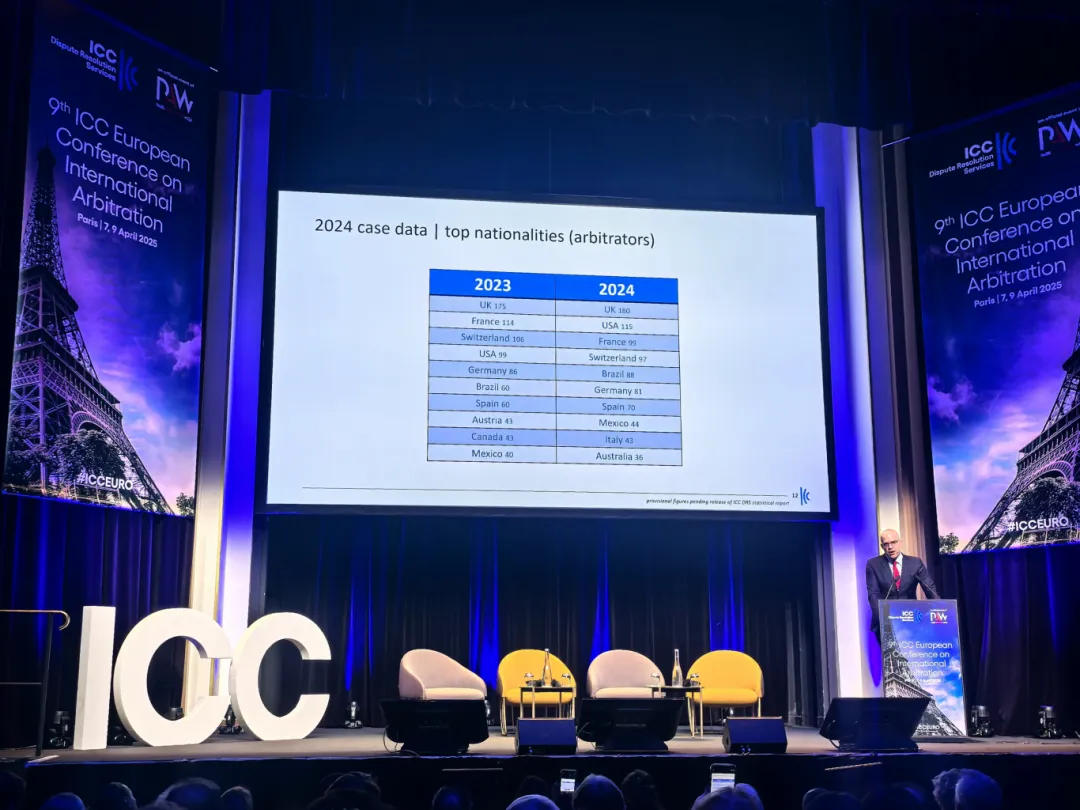
(秘书长亚历山大•费萨斯(Alexander G. Fessas)做工作报告)
2025年4月7日至4月11日,我所合伙人王碧宇律师出席了国际商会仲裁院巴黎仲裁周PAW的活动。在4月7日上午的开幕式现场,秘书长亚历山大•费萨斯(Alexander G. Fessas)就仲裁院2024年的收案情况做了工作报告,仲裁院于2024年新收案件841宗,其中来自中国(含港澳地区)的当事人数量从2023年的第八位攀升至第六位。
现将《2025年国际仲裁调查报告》报告亮点剖析全文分享如下:
Discover key insights from the 2025 International Arbitration Survey
《2025年国际仲裁调查报告》亮点剖析
White & Case’s global team, in collaboration with the School of International Arbitration at Queen Mary University of London, have launched the sixth edition of the International Arbitration Survey.
美国伟凯律师事务所国际业务团队与伦敦玛丽女王大学国际仲裁学院合作,推出了第六版《国际仲裁调查报告》。
The 2025 Survey explores a number of key international arbitration issues, including: how AI is changing the game in international arbitration, efficiency, the enforcement of arbitration awards and public interest issues (such as human rights and corporate social responsibility).
《2025年国际仲裁调查报告》探讨了一系列关键的国际仲裁问题,包括:人工智能如何改变国际仲裁的游戏规则、效率、仲裁裁决的执行以及公共利益(如人权和企业社会责任)等问题。

Highlights 亮点
87% of respondents prefer international arbitration for resolving cross-border disputes.
87%的受访者倾向于通过国际仲裁解决跨境争议。
London top choice
伦敦是首选
总体而言,伦敦是受访者以及仲裁员和律师的首选。在受访者主要执业或开展业务的六个地区中,伦敦和新加坡均位列前五名。
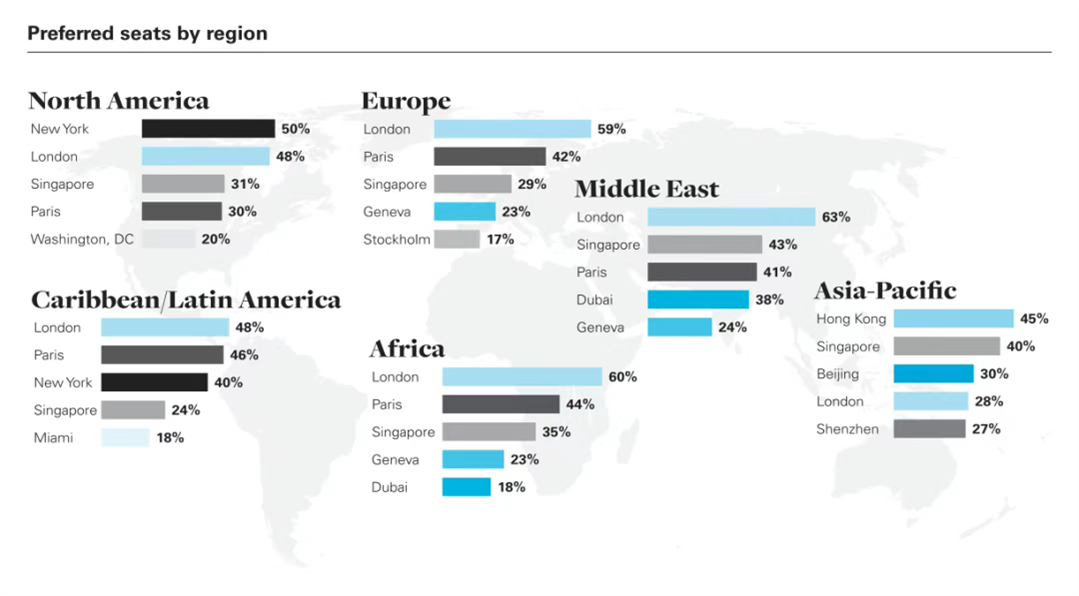

受访者,尤其是亚太和欧洲的受访者,对各自地区的仲裁地表现出强烈的偏好。亚太是香港、北京或深圳位列前五名的唯一地区。在亚太受访者选择的前五名仲裁地中,伦敦是唯一一个非亚洲仲裁地。在欧洲的受访者中,新加坡是首选的前五名仲裁地中,唯一一个非欧洲仲裁地。
North American respondents include New York and Washington DC among their top five choices. New York and Miami are also appreciated by Caribbean and Latin American respondents. Middle East-based respondents favour Dubai in their top five selections, as do respondents in Africa.
北美受访者将纽约和华盛顿列入首选的前五名仲裁地中。加勒比和拉丁美洲受访者也比较喜欢纽约和迈阿密。中东受访者和非洲受访者将迪拜列入首选的前五名仲裁地中 。
The five most preferred seats for arbitration across the full respondent pool are London, Singapore, Hong Kong, Beijing and Paris.
在所有受访者中,最喜欢的五个仲裁地分别是伦敦、新加坡、香港、北京和巴黎。
Respondents cited 117 diverse seats from across the world.
受访者列出了来自世界各地的117个不同仲裁地。
The factors influencing preference for seats, as confirmed by interviewees, were consistent with those singled out by respondents to our previous surveys, such as the support for arbitration by local courts, neutrality and impartiality of the local legal system and national arbitration law and strong enforcement track record.
受访者认为影响仲裁地偏好的因素与我们之前调查的受访者列出的因素一致,包括地方法院对仲裁的支持、地方法律体系和国家仲裁法的中立性和公正性以及良好的执法记录。
ICC Rules lead the way
国际商会仲裁规则位居榜首
The ICC Arbitration Rules top the ranking, with 39% of all respondents including them as one of their choices, closely followed by the HKIAC Rules and the SIAC Rules (each attracting votes from 25% of respondents).
《国际商会仲裁院仲裁规则》在排名中名列前茅,39%的受访者将其作为选择之一,紧随其后的是《香港国际仲裁中心仲裁规则》和《新加坡国际仲裁中心仲裁规则》(各吸引了25%的受访者的投票)。
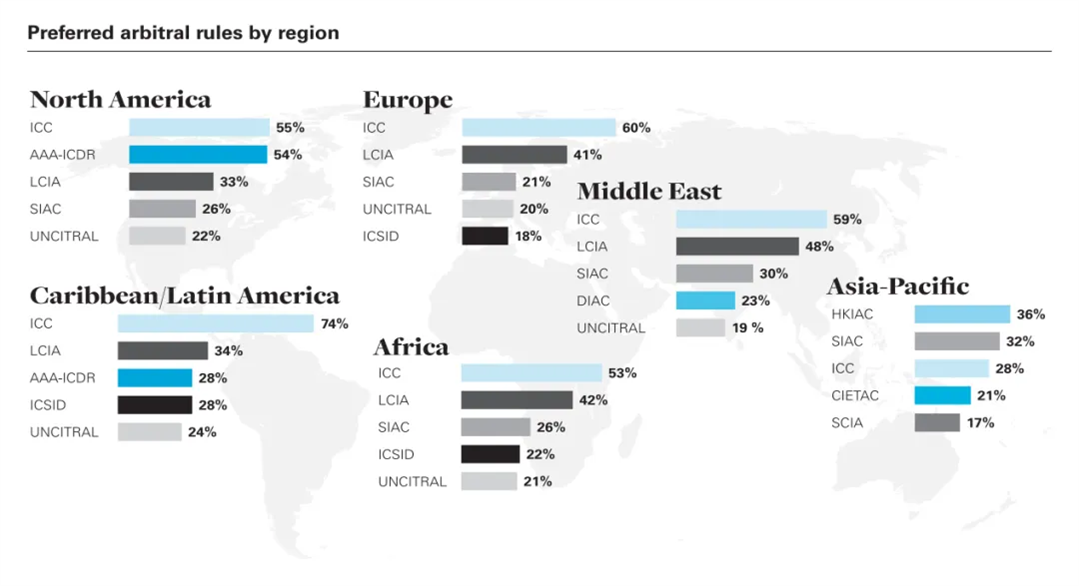
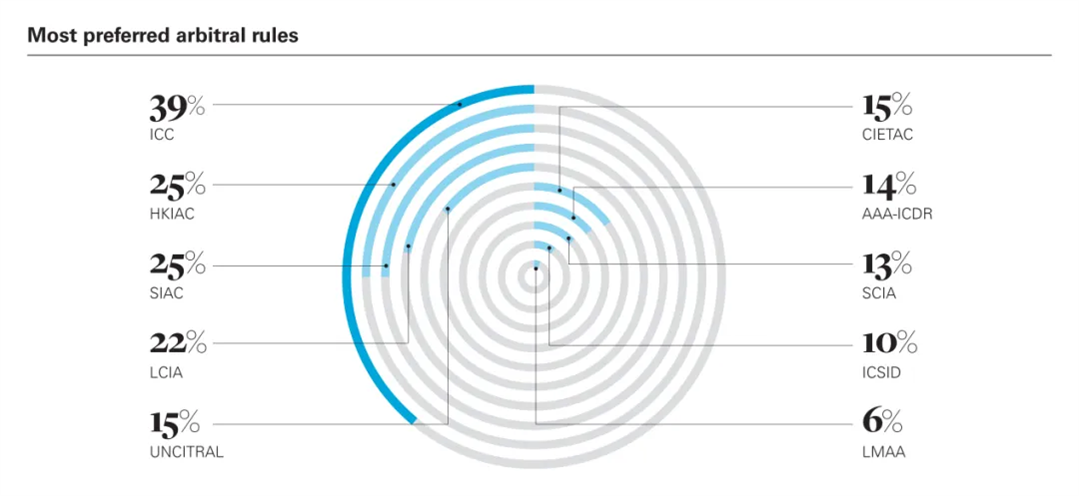
The ICC Rules are in the top three selections for each of the six regions in which respondents principally practice or operate. The SIAC Rules are in the top five for participants from all regions except Caribbean/Latin American. Both the LCIA Rules and the UNCITRAL Rules made the top five for participants from all regions except Asia-Pacific.
在受访者主要执业或开展业务的六个地区中,《国际商会仲裁院仲裁规则》均位列前三名。在除加勒比/拉丁美洲以外的所有地区的受访者中,《新加坡国际仲裁中心仲裁规则》位列前五名。在除亚太地区以外的所有地区的受访者中,《伦敦国际仲裁中心仲裁规则》和《联合国贸易法委员会仲裁规则》均位列前五名。
Asian-Pacific respondents prefer the rules of institutions based in the region, other than the ICC Rules. It is the only region in which the rules of the HKIAC or any Chinese mainland-based rules provider make the top five.
除《国际商会仲裁院仲裁规则》外,亚太地区受访者更喜欢设在本地区的机构的规则。亚太地区是唯一一个采用《香港国际仲裁中心仲裁规则》或任何设在中国大陆的规则提供者的规则位列前五名的地区。
选择具体机构仲裁规则主要是受到机构总体声誉和管理水平的影响,选择临时仲裁规则的主要考量是规则的灵活性和能否量身定制。
Express lane to efficiency
提高效率的快速通道
Both counsel and arbitrators are responsible for behaviour that negatively impacts efficiency in arbitration. Respondents called for greater proactivity and courage from both counsel and arbitrators to address this. On enforcement of awards, the majority of respondents believe annulled awards should not be enforceable.
律师和仲裁员都要对消极影响仲裁效率的行为承担责任,受访者要求律师和仲裁员更加积极、更加勇敢地解决这一问题。在裁决的执行方面,大多数受访者认为被撤销的裁决不应具有执行力。

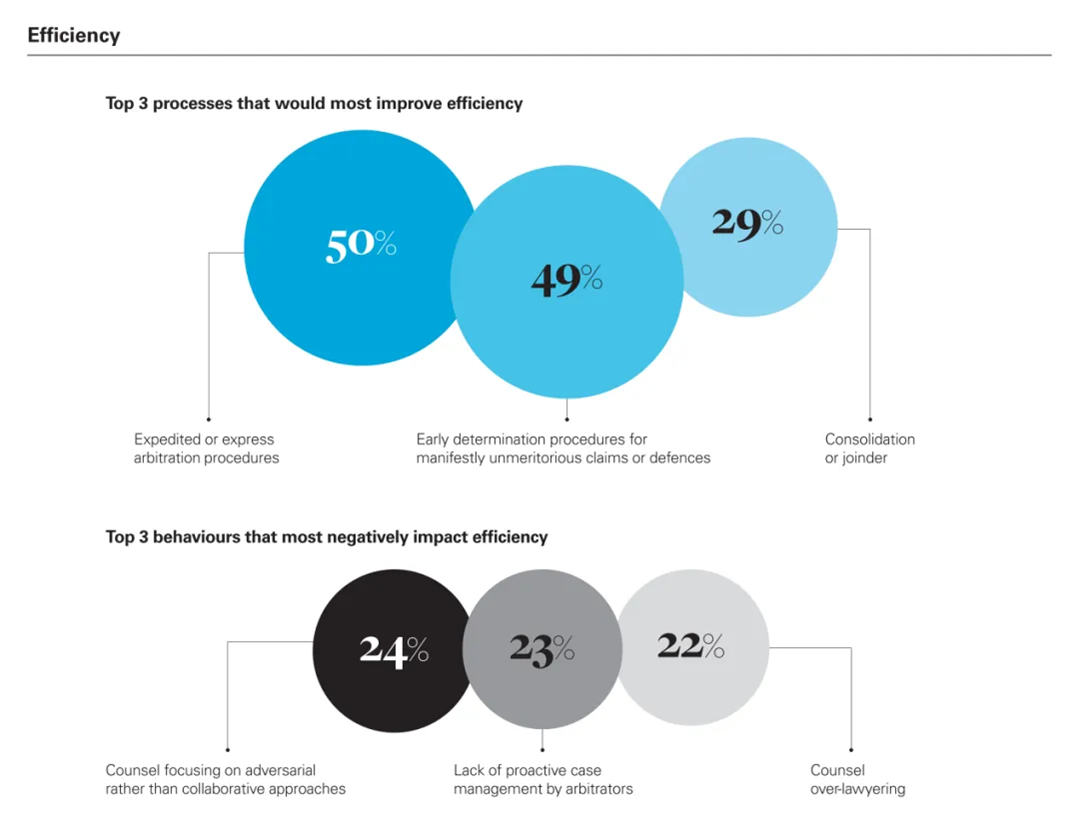
The behaviours that most negatively impact efficiency in arbitration include adversarial counsel approaches (24%), lack of proactive case management by arbitrators (23%), and counsel over-lawyering (22%).
对仲裁效率影响最大的行为包括律师的对抗性(24%),仲裁员缺乏对案件的积极管理(23%),以及律师过度干预(22%)。
Expedited arbitration procedures (50%), early determination procedures for manifestly unmeritorious claims or defences (49%) and consolidation or joinder (29%) are considered the most effective mechanisms for improving arbitration efficiency.
加速仲裁程序(50%),对明显无优势的主张或抗辩的早期决定程序(49%)以及合并或追加当事人(29%)被认为是提高仲裁效率的最有效的机制。
Respondents enjoyed excellent experiences with mechanisms for expediting arbitrations, such as expedited arbitration procedures embedded in arbitral rules and paper-only arbitration, and would be willing to use them again. They also acknowledged the need to balance efficiency with procedural fairness.
受访者在加速仲裁机制方面享有丰富的经验,例如包含在仲裁规则中的加速仲裁程序,以及只使用纸质仲裁,并且愿意再次使用这些机制。他们也承认平衡效率和程序公正的必要性。
61% of respondents think awards that are annulled at the seat should not be enforceable in other jurisdictions, although some suggest it might be advisable to allow enforcement of an award that has been annulled in questionable circumstances.
Keeping it confidential
仲裁保密性
Public access to arbitration
向公众提供仲裁的机会
AI as game changer
人工智能改变游戏规则
AI in international arbitration
人工智能在国际仲裁中的应用
90%的受访者预计将人工智能用于研究、数据分析和文件审查。
54% say saving time is the biggest driver for use of AI.
The principal drivers for the increased use of AI in international arbitration are saving party and counsel time (54%), cost reduction (44%) and reduction of human error (39%).
普遍的共识是,在未来五年内,国际仲裁及其用户将采用并适应人工智能。目前而言,由于对透明度、明确的指导方针和人工智能使用培训的渴望,受访者对更多使用人工智能的热情有所减弱。
原文链接详见:泰和泰研析 丨2025年国际仲裁调查报告亮点剖析